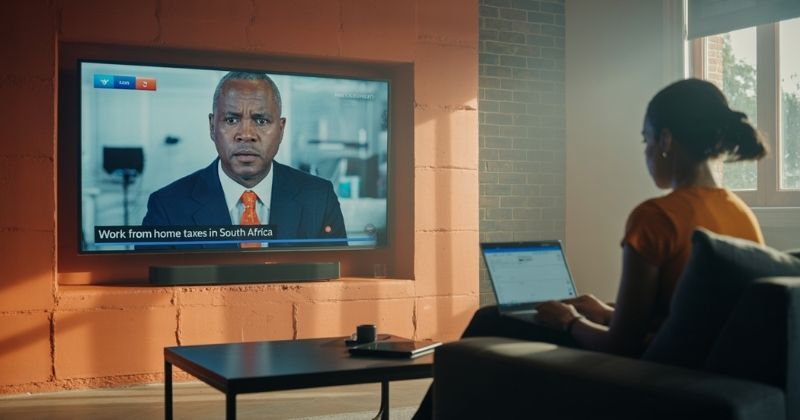
Tax professionals have clarified the circumstances under which South Africans may qualify for home office deductions during the 2025 tax filing season, though they caution that the current tax framework imposes significant obstacles. Many employees who shifted to remote work during and after the pandemic are now finding that claiming tax relief for their home setup is not as simple as expected.
Key Takeaways
- Strict Criteria for Home Office Deductions: Salaried employees in South Africa must meet specific conditions to claim home office expenses, including using a dedicated workspace for more than 50% of their duties and having written confirmation of remote work from their employer.
- Limitations Under Section 23(m): Most fixed-salary earners are restricted from deducting general business-related costs such as internet, stationery, or phone bills, even if they work from home full-time, due to legislative constraints.
- Burden of Proof Lies with the Taxpayer: SARS requires clear evidence and supporting documentation for any home office claim, and even valid claims may be questioned if they fall outside the narrow set of allowed expenses.
About Arcadia Finance
Get the loan you need quickly and easily with Arcadia Finance. There are no application fees, and you can choose from 19 trusted lenders, all registered with South Africa’s National Credit Regulator. Enjoy a simple and secure process designed around your financial goals.
Strict Rules Under Income Tax Act Apply to Home Office Claims
South Africa’s Income Tax Act sets out particular regulations regarding home office deduction claims, but the process is often more complicated than most taxpayers expect. Even though many believe that working from home automatically entitles them to tax relief, the law draws hard lines that must be met without exception.
Experts from Tax Consulting SA explained that individuals who earn commission generally benefit from greater leniency when seeking these deductions. However, employees who receive a fixed salary while working from home may face more difficulty. This distinction is crucial because salaried workers often make up the majority of remote employees, leaving many ineligible for deductions despite working full-time from home.
The issue arises from the stricter legislative conditions applicable to salaried staff in contrast to those earning variable income.
In cases where an individual receives a fixed monthly salary, performs their job remotely on a full-time basis, and works in a space that is exclusively used for business purposes, there may be some justification to submit a deduction claim for home office costs, assuming the detailed requirements in the legislation are fully satisfied.
These requirements are not mere formalities; they involve measurable usage, physical separation of workspaces, and clearly documented employer authorisation.
That said, it remains the responsibility of the employee to present credible evidence to SARS in support of such a claim. Failure to produce sufficient proof could result in penalties or the disallowance of the claim altogether.

Applicable Sections of the Income Tax Act Explained
Tax Consulting pointed to three crucial clauses in the Income Tax Act that govern such deductions:
- Section 11(a): General deduction formula
- Section 23(b): Use of home premises for work purposes
- Section 23(m): Restrictions on deductions for salaried earners
Section 11(a), which is commonly referred to as the general deduction formula, permits taxpayers who are considered to be conducting a trade to deduct any expenses or financial losses that were actually incurred in the process of generating income, provided that those costs are not classified as capital in nature. This foundational section underpins most deduction claims across a variety of professions.
For salaried employees, the concept of “trade” is interpreted to include formal employment, which means that receiving remuneration through employment qualifies as engaging in a trade.
Therefore, where an employee incurs legitimate costs related to a home office setup in connection with earning their employment income, such expenses could theoretically fall under the scope of section 11(a). Examples include a proportional share of rent, electricity, and even depreciation on office furniture used strictly for business.
However, when applying section 11(a), it must be done with consideration to the additional limitations that appear under Section 23.
Domestic Use of Premises Restriction: Section 23(b)
Section 23(b) places an explicit restriction on the deduction of any expenses linked to residential premises being used for personal or domestic reasons.
Nonetheless, an exception may apply if the following three conditions are all met:
- The taxpayer uses a separate and identifiable part of their home strictly for performing work-related duties
- That area is properly fitted with equipment necessary for their job
- The space is used routinely and exclusively for work purposes
In cases involving salaried individuals who are not commission earners, they must complete more than 50% of their total work responsibilities from this designated space in order to satisfy the legal threshold. Simply checking emails from the dining table or making occasional work calls from the lounge does not qualify.
Tax experts noted that individuals working remotely on a full-time basis from a well-defined, dedicated home office may technically meet the eligibility criteria, but that is only the first step. SARS has the discretion to scrutinise these claims thoroughly, and vague or partial compliance often leads to rejections.

Potential Hurdles When Making a Deduction Claim
According to Tax Consulting, another obstacle lies in Section 23(m), which prohibits the majority of deduction claims under Section 11 when the taxpayer:
- Earns a fixed remuneration such as a salary, and
- Does not earn at least 50% of their income from commission or similar performance-based pay
This means that employees who receive a set salary and no commission are generally blocked from deducting most expenses, losses, or allowances that would have been permitted under Section 11(a).
Only specific types of expenses that are directly associated with the upkeep and usage of the workspace, such as rent, utility bills, or cleaning services, might be considered for deduction. Even then, the allowable deductions are subject to highly restrictive terms.
These narrowly defined expenses must also be apportioned correctly, often calculated as a percentage of floor space used exclusively for work.
In effect, although Section 11(a) opens the door to claiming legitimate costs and Section 23(b) outlines the requirements for a home office, Section 23(m) effectively closes that door for most fixed-salary workers.
This legal framework means that even if an employee satisfies the general rules and meets the home office-specific criteria, they may still be prevented from deducting everyday work-related costs such as internet usage, mobile phone expenses, accounting fees, or office stationery. Many of these items, while necessary for work, are considered private-use or mixed-use expenses and thus are disqualified under current rules.

How Fixed-Salary Remote Workers Can Strengthen Their Case
Tax Consulting emphasised that fixed-salary workers who perform their jobs entirely from home and wish to claim home office deductions should ensure the following steps are followed:
- Their employer must provide formal written confirmation that they are permitted to work remotely
- The workspace at home must be separate, clearly designated, and used only for work purposes
- At least half of their job duties must be performed from this specific area
- Any claim made must be confined solely to costs directly tied to the premises
Despite meeting these conditions, taxpayers may still find that SARS questions any deduction that falls outside the limited set of recognised expenses. This is why clear documentation, floor plans, utility bills, and employer letters are vital in building a strong case.
The responsibility lies entirely with the taxpayer to demonstrate that any claim submitted is legitimate and complies fully with the Income Tax Act. With SARS increasing the use of auto-assessments and electronic audits, supporting documents must be readily available at the time of filing, not only upon request.
Conclusion
While the idea of claiming tax deductions for working from home may seem appealing, South Africa’s tax laws make it particularly difficult for fixed-salary employees to benefit. With stringent requirements under the Income Tax Act and limited categories of allowable expenses, only those who can prove consistent, exclusive use of a home office and meet all legal thresholds may qualify. Even then, SARS may still challenge claims, reinforcing the importance of thorough recordkeeping and clear employer documentation.
Fast, uncomplicated, and trustworthy loan comparisons
At Arcadia Finance, you can compare loan offers from multiple lenders with no obligation and free of charge. Get a clear overview of your options and choose the best deal for you.
Fill out our form today to easily compare interest rates from 19 banks and find the right loan for you.

